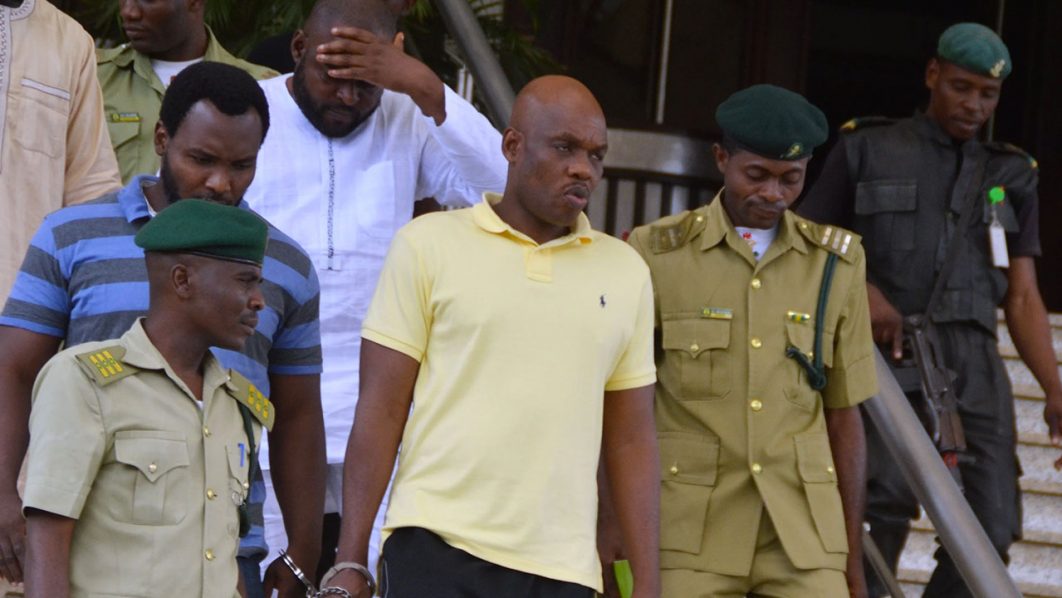 |
| Charles Okah |
The treason trial of alleged masterminds of October 1, 2010 bombing in Abuja, Charles Okah and Obi Nwabueze came to a sad end today as the Federal High Court, Abuja, found them guilty of the offense and sentenced them to life imprisonment.
The trial judge, Justice Gabriel Kolawole, who delivered the seven-hour judgment on the eight-count terrorism charge held that Okah, a younger brother to former leader of the Movement for the Emancipation of the Niger Delta (MEND), Mr. Henry Okah, and his accomplice, Mr. Obi Nwabueze, used dynamites to unleash acts of terrorism on Nigerians and foreign dignitaries, who had gathered at the Eagle Square for the Independence day celebration.
The judge held that both the documentary and oral evidence that were adduced by the Federal Government linked the convicts (Okah and Nwabueze) to the Independence Day bombing at the Eagles Square.
“The defendants are found guilty as charged in the five out of the eight-count charge contained in the amended charge dated January 10, 2011 and filed January 11, 2011, which relate to them. “They are accordingly convicted as charged,” Justice Kolawole held.
Furthermore, the court dismissed the convicts’ plea for clemency, and agreed with the prosecuting counsel, Dr. Alex Iziyon (SAN), who had urged the court to discountenance the convicts’ allocutus (plea for mercy).
“The convicts are hereby sentenced to life imprisonment,” the court declared.While the Okah brothers were alleged to have coordinated as well as procured all the materials that were used for the attack, the Federal Government told the court that it was the second defendant, Nwabueze, that helped them to fix Improvised Explosive Devices, (IEDs) in two cars used for the bombing.
Okah, Nwabueze, Edmund Ebiware and Tiemkemfa Francis-Osvwo (aka General Gbokos) were initially arraigned before the court on December 7, 2010, over their alleged involvement in the bomb blast, which killed about 12 people and injured several others.
However, Francis-Osvwo later died in prison custody, while Ebiware, who had his trial conducted separately, is currently serving life imprisonment upon his conviction in 2013, leaving Okah and Nwabueze to face their trial.
In the cause of the trial on the suit marked FHC/ABJ/CR/186/2010, the prosecuting counsel, Alex Izinyon (SAN), called 17 witnesses to prove that the defendants actually committed the offence. And at the close of case by the prosecution, the defendants filed a No-case-submission on the ground that there was no need to enter defense, since to him, there was no substantial evidence against.
Unfortunately Justice Kolawole dismissed the No-case Submission filed by Okah’s lawyer, Emeka Okoroafor and Oghenovo Otemu, who stood for the second defendant, on June 1, 2017.
The judge held that the prosecution has made out prima facie case through testimonies of witnesses, which linked the defendants with the charges and as such, required them to offer explanations for their actions.
Consequently, the court ordered the defendants to open their defence on July 5, 2017. On December 15, the defence team closed their case after calling seven witnesses, and the judge later fixed judgment for yesterday.
In this article:
The trial judge, Justice Gabriel Kolawole, who delivered the seven-hour judgment on the eight-count terrorism charge held that Okah, a younger brother to former leader of the Movement for the Emancipation of the Niger Delta (MEND), Mr. Henry Okah, and his accomplice, Mr. Obi Nwabueze, used dynamites to unleash acts of terrorism on Nigerians and foreign dignitaries, who had gathered at the Eagle Square for the Independence day celebration.
The judge held that both the documentary and oral evidence that were adduced by the Federal Government linked the convicts (Okah and Nwabueze) to the Independence Day bombing at the Eagles Square.
“The defendants are found guilty as charged in the five out of the eight-count charge contained in the amended charge dated January 10, 2011 and filed January 11, 2011, which relate to them. “They are accordingly convicted as charged,” Justice Kolawole held.
Furthermore, the court dismissed the convicts’ plea for clemency, and agreed with the prosecuting counsel, Dr. Alex Iziyon (SAN), who had urged the court to discountenance the convicts’ allocutus (plea for mercy).
“The convicts are hereby sentenced to life imprisonment,” the court declared.While the Okah brothers were alleged to have coordinated as well as procured all the materials that were used for the attack, the Federal Government told the court that it was the second defendant, Nwabueze, that helped them to fix Improvised Explosive Devices, (IEDs) in two cars used for the bombing.
Okah, Nwabueze, Edmund Ebiware and Tiemkemfa Francis-Osvwo (aka General Gbokos) were initially arraigned before the court on December 7, 2010, over their alleged involvement in the bomb blast, which killed about 12 people and injured several others.
However, Francis-Osvwo later died in prison custody, while Ebiware, who had his trial conducted separately, is currently serving life imprisonment upon his conviction in 2013, leaving Okah and Nwabueze to face their trial.
In the cause of the trial on the suit marked FHC/ABJ/CR/186/2010, the prosecuting counsel, Alex Izinyon (SAN), called 17 witnesses to prove that the defendants actually committed the offence. And at the close of case by the prosecution, the defendants filed a No-case-submission on the ground that there was no need to enter defense, since to him, there was no substantial evidence against.
Unfortunately Justice Kolawole dismissed the No-case Submission filed by Okah’s lawyer, Emeka Okoroafor and Oghenovo Otemu, who stood for the second defendant, on June 1, 2017.
The judge held that the prosecution has made out prima facie case through testimonies of witnesses, which linked the defendants with the charges and as such, required them to offer explanations for their actions.
Consequently, the court ordered the defendants to open their defence on July 5, 2017. On December 15, the defence team closed their case after calling seven witnesses, and the judge later fixed judgment for yesterday.
In this article:
